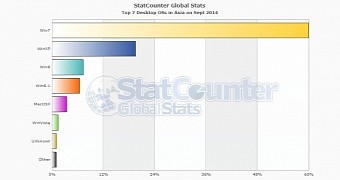Everybody knows that Windows 7 is currently the world’s number one desktop operating system, and market researchers claim that it’s now powering more than 50 percent of the PCs on the planet.
While this is clearly impressive and very good news for those using Windows 7, it’s also pretty disappointing for Microsoft, as its modern operating systems are still gaining ground at a really slow pace.
Market share figures provided by StatCounter indicate that Windows 7 has grown so much that together with Windows XP it’s powering nearly 80 percent of the desktop computers in Asia, a large continent where Windows 8 and 8.1 are yet to make a name for themselves.
Needless to say, both Windows 7 and Windows XP are bringing new users on board every month, mostly because they’re easier to crack and unlicensed versions can be found online in just a few minutes.
Windows 7 powering nearly 60 percent of the desktops
While Windows XP is no longer getting support and patches from Microsoft, Windows 7 continues to be Asia’s favorite operating system, so it’s now installed on no less than 59.91 percent. Stats show that Windows 7 increases its market share every month, and this growing trend is unlikely to stop until the release of Windows 9 Technical Preview.
Windows XP comes second in these rankings with a market share of 19.53 percent, followed by Microsoft’s modern operating systems, Windows 8 and Windows 8.1, with 7.25 and 6.45 percent, respectively.
Unsurprisingly, Mac OS X is far behind with 3.45 percent, followed by the ever collapsing Windows Vista with 1.43 percent and other operating systems which have a combined market share of 1.01 percent.
It all comes down to piracy
If you’re wondering how come that Windows 7 and Windows XP are powering so many desktop computers in Asia, the answer is as simple as it could be: it’s because of piracy.
Asia is one of the regions where Microsoft failed to tackle piracy in a very effective manner, and although the company launched several campaigns to convince users to buy legitimate software, pirated Windows usage continues to be at steady levels.
Microsoft, however, knows that Windows piracy in Asia is a serious problem, but it hopes that everything could change in the coming Windows releases thanks to new systems supposed to make the software product harder to crack.
Even Steve Ballmer has admitted that piracy is a serious problem in the region, revealing that 9 out of 10 Windows copies in China are using a pirated license.
No wonder that so many users actually refuse to switch to Windows 8.

 14 DAY TRIAL //
14 DAY TRIAL //